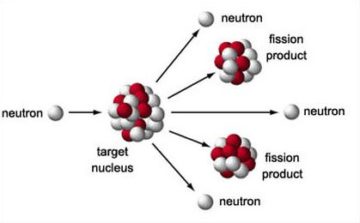
There is no natural process that occurs due to nuclear fission reactions. On the contrary, this process requires very high temperature and high-pressure density to fuse atoms. This process does not require high temperature and high-pressure density to split atoms. The energy that we harness from nuclear fusion is very high as compared to nuclear fission.Īll bi-products of the fission reaction are highly radioactive in nature.Īll bi-products of the fusion reaction are very less radioactive in nature. The energy that we harness from nuclear fission is very low as compared to nuclear fusion. Requires a very large amount of energy to merge or fuse atoms. Requires a very little amount of energy to split atoms. Merger of smaller nuclei to form a larger nucleus.

Splitting of a larger nucleus to form smaller nuclei. But, before going into the deep discussion, let me give you a brief review of the two in a tabular form. As a matter of fact, in this exclusive article, I am going to get you through each and every detail regarding these two. On the other hand, nuclear fusion is a process during which lighter elements fuse together to form heavier elements. So, what is the difference between nuclear fission and nuclear fusion? The primary difference between fission and fusion is that nuclear fission is a process during which a heavier nucleus of an atom (say plutonium) breaks into two lighter nuclei. Just because of the demand for the topic, we are only interested in these two. These are nuclear fission and nuclear fusion reactions. Not to mention, there are two ways to harness nuclear energy from the nucleus of an atom. Out of all, today, we are only interested in the form of energy that we harness from the nucleus of an atom i.e Nuclear energy. Both nuclear reactions can be used in the creation of nuclear weapons.There are so many forms of energy that exist in nature. This reaction can provide us with an immense source of energy, much greater than a fission reaction.ĥ. In nuclear fusion, atoms are forced together to create new more powerful atoms. Fusion is the complete opposite to fission.Ĥ. Nuclear fission involves splitting the nuclei of an atom to forge two new atoms, the nuclear reacting caused by splitting the molecules results in a large output of energy.ģ. Nuclear fission and nuclear fusion are both atomic reactions of matter.Ģ. Both reactions cause immense levels of energy that can cause devastating effects when used as weapons.ġ. In conclusion the simplest way to observe the differences between nuclear fission and nuclear fusion is as follows fission creates two atoms from one and fusion masses together to create one atom. If used today, humanity would be destroyed. The hydrogen bomb is a hundred times more powerful than any nuclear reaction caused by fission. When atomic fusion is caused using hydrogen it can have devastating effects. Fusion is the process that involves squishing the lighter atoms together to produce one large atom. Atoms are grouped into two forms, the light atoms and the heavy atoms. Fusion is basically the process of pushing the smaller atoms together. It is the process of fission that powers some of our nuclear weapons.įusion, although being an atomic reaction, couldn’t be greater in difference to fission. When your atoms collide together they create a whole ball of energy that can be used for many things. In layman’s terms the act of fission is to smash atoms. Each atom that is split will release a collection of particles called neutrons these particles interact with the other atoms, blasting them apart. In a fission reaction each atom is split into two and a large amount of energy is generated. The action of fission involves separating an atoms components.

The foundation word generally means to split something. Lets first look at fission the term fission deviates from the source word fissure. Both reactions can cause an immense release of energy but a chemical reaction is often slower to take place than a nuclear reaction. In a chemical reaction, it is the molecules that are rearranged, and the atoms that remain in an unchanged state. The first is a nuclear reaction this is a process that changes the arrangement of the protons and neutrons found in the atoms nucleus. There are two different reactions that we need to think of when looking at the differences between fission and fusion. Both fission and fusion are complicated forms of nuclear reaction. They are completely different processes involving different atomic reactions of matter. There is a distinct variation that transpires when using Fission or Fusion.


 0 kommentar(er)
0 kommentar(er)
